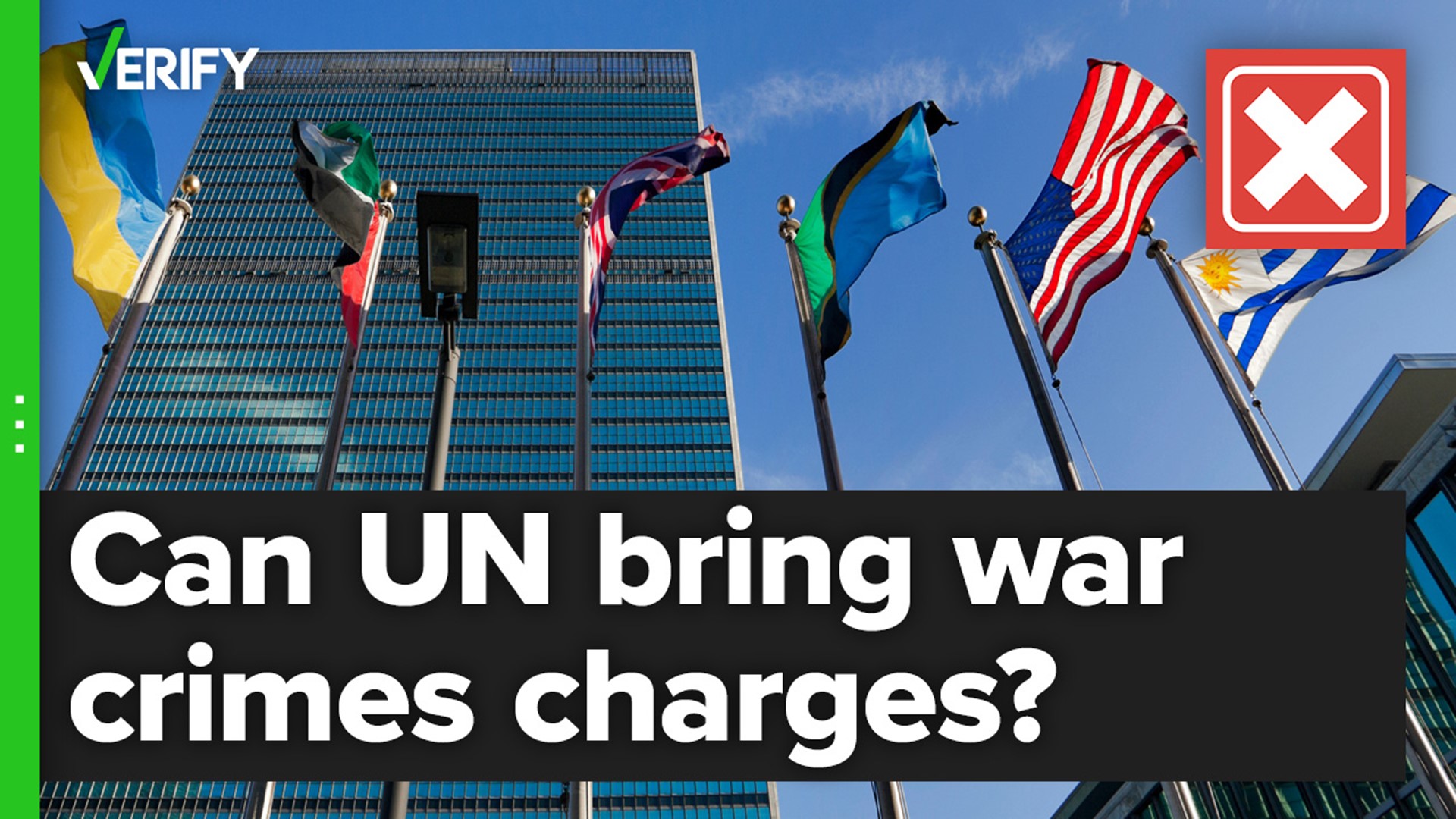As Russia’s attack on Ukraine continues, news outlets have reported that Russian leaders, including President Vladimir Putin, could face war crimes charges.
Dmytro Kuleba, Minister of Foreign Affairs to Ukraine, said in a tweet on Feb. 25 that reported “Russian attacks on a kindergarten and an orphanage are war crimes and violations of the Rome Statute [of the International Criminal Court].” Amnesty International, a nongovernmental organization focused on human rights, also said Russian attacks on Ukraine “could constitute war crimes.”
Connie emailed the VERIFY team to ask if the United Nations can charge leaders like Putin with war crimes and, if not, who has the authority to do so.
THE QUESTION
Does the United Nations have the authority to charge people with war crimes?
THE SOURCES
- The United Nations (UN)
- International Criminal Court (ICC)
- TRIAL International, a nongovernmental organization
- Michael P. Scharf, J.D., Dean of Case Western Reserve University’s School of Law
THE ANSWER
No, the United Nations doesn’t have the authority to charge people with war crimes, but its Security Council can refer a case to the International Criminal Court (ICC).
WHAT WE FOUND
The United Nations doesn’t charge a country’s leaders with war crimes or prosecute them, though it can refer a case to the International Criminal Court (ICC). Both international and domestic courts can charge a country’s leaders with war crimes and prosecute them.
VERIFY explains below what war crimes are and how they’re prosecuted.
What are war crimes?
The United Nations (UN) is an international organization founded in 1945 that is currently made up of 193 Member States. It says the concept of war crimes emerged at the end of the 19th century and beginning of the 20th century when international humanitarian law, also known as the law of armed conflict, was arranged.
The UN explains that war crimes can be divided into these categories: those against people requiring particular protection; those against people providing humanitarian assistance and peacekeeping operations; those against property and other rights; prohibited methods of warfare; and prohibited means of warfare.
Additionally, the UN outlines acts that are prohibited in warfare. They include murder, mutilations, cruel treatment and torture; taking of hostages; intentional attacks against civilians; and intentional attacks against buildings directed to religion, education, art, science or charitable purposes, historical monuments or hospitals, among others.
The Hague Conventions, a series of international treaties that were issued from conferences held at The Hague in the Netherlands in 1899 and 1907, prohibit “warring parties to use certain means and methods of warfare,” the UN says. The Geneva Convention of 1864 and later versions of the Geneva Conventions “focus on the protection of persons not or no longer taking part in hostilities.”
There isn’t a single document that lists all war crimes, but they can be found in international humanitarian law and international criminal law treaties, and international customary law, according to the UN.
Who prosecutes war crimes?
International and domestic courts can charge a person with war crimes and prosecute them.
TRIAL International is a nongovernmental organization that provides legal assistance to victims of international crimes. Phillip Grant, the organization’s executive director, said in an email that the UN itself does not charge people with war crimes – only courts can do that.
On its website, TRIAL International explains that “domestic courts are usually responsible for prosecuting war crimes.” However, the International Criminal Court (ICC) and other courts can also prosecute them.
The ICC, established by the Rome Statute, works in tandem with the UN but is not part of the organization. It is an “independent judicial body” that has jurisdiction over people charged with genocide, crimes against humanity and war crimes, the UN says on its website. The UN Security Council can refer certain situations to the ICC prosecutor.
On Feb. 28, ICC Prosecutor Karim A.A. Khan said in a statement that he would move forward with opening an investigation into the situation in Ukraine.
“In particular, I am satisfied that there is a reasonable basis to believe that both alleged war crimes and crimes against humanity have been committed in Ukraine in relation to the events already assessed during the preliminary examination by the Office,” Khan said. “Given the expansion of the conflict in recent days, it is my intention that this investigation will also encompass any new alleged crimes falling within the jurisdiction of my Office that are committed by any party to the conflict on any part of the territory of Ukraine.”
Khan said his office will now need to seek and obtain authorization to open an investigation from the Pre-Trial Chamber of the ICC. An ICC State Party, countries that have ratified or accepted the Rome Statute, could also refer the situation to his office. This would then allow the office to “actively and immediately proceed” with its investigation.
Ukraine is not a State Party to the Rome Statute, so the country cannot refer the situation to Khan’s office, he said.
Michael P. Scharf, J.D., is dean of Case Western Reserve University’s School of Law. Scharf served in 2008 as Special Assistant to the Prosecutor of the Cambodia Genocide Tribunal and has also served as delegate to the United Nations Human Rights Commission. He explained that international crimes are called “crimes of universal jurisdiction,” meaning any country can prosecute if those crimes violate their own laws.
The ICC also has jurisdiction over war crimes and other international crimes if they are committed in a state that has accepted the court’s jurisdiction, which Ukraine did in a letter to the ICC, Scharf said. That led to the ICC opening a preliminary investigation following the 2014 invasion of Crimea and the country’s other eastern territories.
The UN General Assembly can also create an investigative mechanism that would help collect evidence of war crimes for eventual prosecution, Scharf said.

